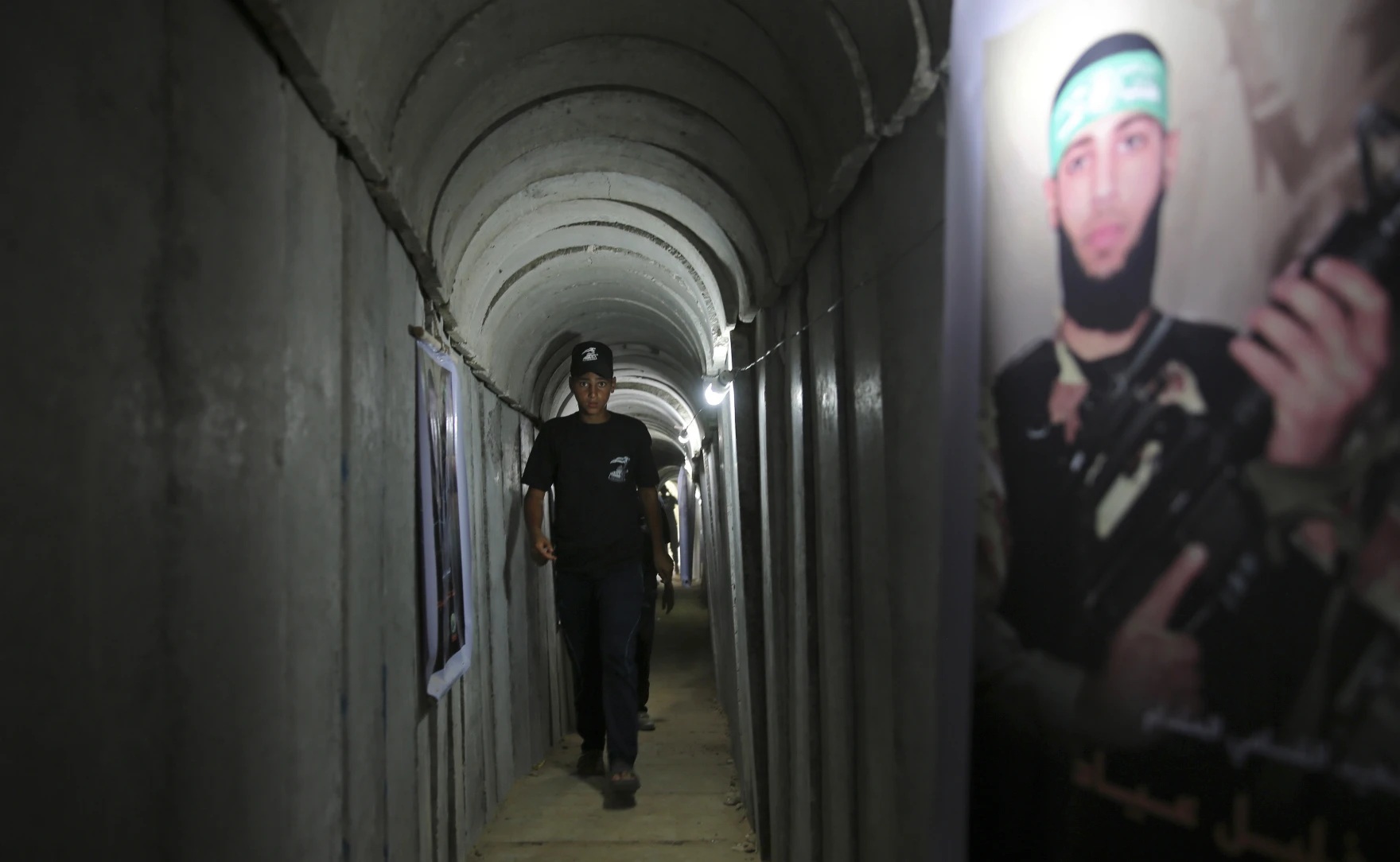
The more I watch those videos of the seemingly endless Hamas tunnels in Gaza, the more I start to grasp what we are up against. It is not just an enemy, but an ontology. A worldview poured in concrete and darkness, a philosophy you can walk through if you dare to stoop low enough.
By Rafael Baroch
Let me say this first: I am impressed. Truly. The sheer technical ingenuity is staggering. Hundreds of kilometres of tunnels, some thirty meters deep, with concrete walls, electricity, ventilation shafts, command posts, dormitories, and storage rooms. A shadow state beneath a besieged strip of land forty by ten kilometres – barely larger than Manhattan.
I catch myself thinking the thought you’re not supposed to admit out loud: how the hell do you even do this? How do you keep digging? How do you remove tons of soil without anyone noticing? How do you build not just a tunnel but an entire second geography beneath the first? What kind of technology, what type of planning, what kind of relentless perseverance does this require?
How do you dig meters deep, through sand and rubble, without the world noticing? Where do you dump the soil? How do you lay concrete walls without making a sound? Who draws the blueprints, who plans the shifts? And, more unsettling still: who believes for twenty years that this is meaningful, that it will pay off, that it leads anywhere other than to a deeper hole?
And then the thought intrudes that you would rather not think: maybe that is precisely the point. The hole itself. The depth. The shadow. The tunnel is not a passage. It is the destination. Not a means to achieve something, but the thing achieved.
And then the realisation hits: this is not improvisation. Not a ragtag insurgency scratching together whatever they can find in the ruins. This is systematic, calculated, and multi-generational. And Hamas undertook this after Israel’s withdrawal.
That Gaza has not been de jure occupied since 2005 is not a controversial claim – Israel pulled out entirely, soldiers and settlers alike. Whether that amounted to full self-determination is a legitimate debate. But what has been clear ever since is that Hamas exercises de facto authority in Gaza. And that authority, instead of investing in state-building or a livable future for Palestinians, has been devoted to military build-up and ideological indoctrination.
That is not simply the result of Israeli policy, but a deliberate choice by Hamas.
It cannot be the work of a small faction alone. You don’t build hundreds of kilometres of fortified tunnel with a handful of extremists and a few shovels. This is a national project – in scope, in vision, in labour. A civilisational effort, comparable not to a terror cell but to the building of dams, of dikes, of megastructures meant to outlast generations.
It requires not just engineers, but ethicists, educators, and logisticians. It requires an ethos. And that ethos must be widespread. It must circulate through classrooms, sermons, songs, jokes, and textbooks. The tunnel is not just under the ground. It is in the culture.
The tunnel is not an escape route. The tunnel is the strategy. Not a path out of war, but a path into it. A permanent architecture of enmity.
Most terror groups are episodic, improvisational, ad hoc – a car bomb here, a hijacking there, a sudden flare of violence meant to scare, provoke, or pressure. The tunnels tell a different story: not a politics of leverage but a politics of annihilation. Ordinary terror wants something: concessions, visibility, revenge, sometimes even a seat at the table. The tunnel wants nothing but total war. It is uncompromising. It is survival as destruction.
Seven hundred kilometres. Consider this: the length of an entire country, but underground, invisible, and inaccessible to satellites. As defence, as offence, as doctrine. This is not cat-and-mouse, not hit-and-run, but an entire mode of existence. A war plan so structural that it rewrites daily life, not as preparation for peace but as an apprenticeship in endless struggle.
And here is the deeper, darker point: twenty years of digging doesn’t just build tunnels, it builds minds. It creates a consciousness adapted to shadow and confinement. You raise children who believe the future is not above them in the light, but below them, in the cement and the dirt. A people that lives in tunnels will eventually think in tunnels. You don’t imagine horizons, you imagine escape hatches. You don’t believe in compromise; you think in collapse.
The tunnel becomes epistemology. An underground metaphysics of war. You don’t just train fighters; you train perception itself: survival as a way of seeing, resistance as a way of breathing. You dig not just through soil, but through reality.
And suddenly, it explains why this war feels different. It’s not a skirmish, not even a campaign. It’s two incompatible ontologies colliding. One side still clings, however hypocritically, to notions of compromise, negotiation, and the eventual horizon of peace. The other side has literally built itself into a world without exits. A world where every path leads deeper underground, where the absence of an exit becomes proof of faith.
And then comes the question no one dares ask, but which hangs in the air like dampness in an unventilated room: how do you fight an enemy that does not want an exit?
You can defeat an army, topple a state, assassinate a leader – but how do you fight an infrastructure that is at once military and mental? How do you destroy a space that is not merely a strategy but also a form of life? Bombing a tunnel only closes a passage for a while; the idea that the tunnel embodies remains.
The tunnel forces us to confront what we would rather not see: that here war is not an accident, not an emergency, not an instrument of politics to be shelved once negotiations resume. War is the furniture itself, the foundation, the load-bearing wall.
Perhaps that is why this conflict feels so intractable. Because you cannot negotiate with a tunnel. A tunnel does not sign accords. A tunnel does not declare a ceasefire. A tunnel can only collapse. And even then, it continues underground as memory, as symbol, as invitation to repetition.
Whoever builds a war without an exit also builds a life without a horizon. And the tragic, or perhaps obscene, truth is that you cannot fight such a life without becoming tunnel-like yourself: dark, sealed off, endlessly preparing for the next attack.
And so we are left with a paradox that no general, no jurist, no diplomat can resolve: how do you fight an enemy that does not want to win, but only to exist in an eternal struggle?
The answer may be painfully simple, and therefore unbearable: you cannot conquer the tunnel, because the tunnel is not built to be conquered. The tunnel does not negotiate, does not sign accords, does not declare ceasefires. It endures. It waits. It exists to swallow you whole eventually.







How do you fight an enemy that does not want an exit?
Whoever builds a war without an exit also builds a life without a horizon.
We need the Supernatural, or it might go on, with all the consequences that entails.